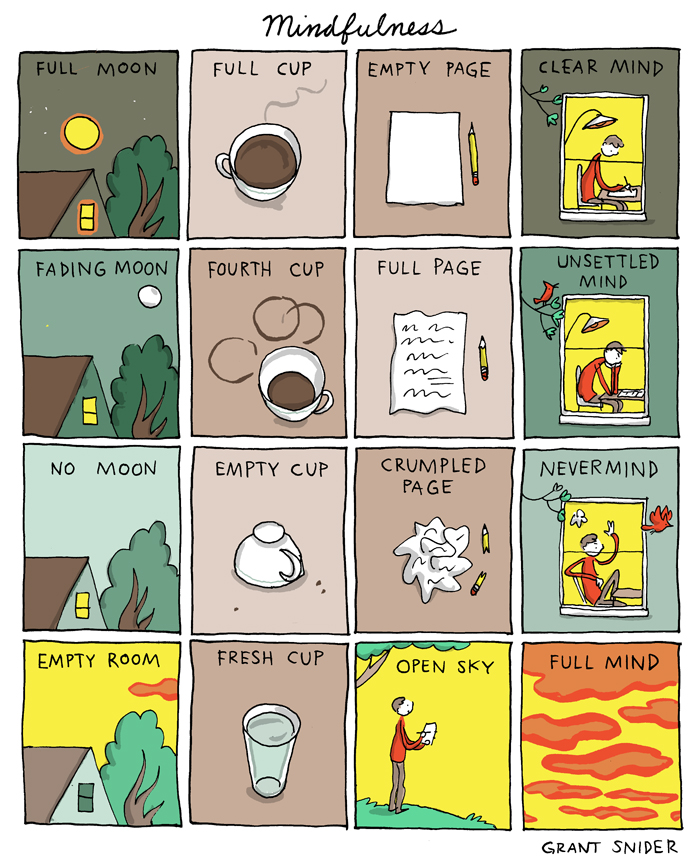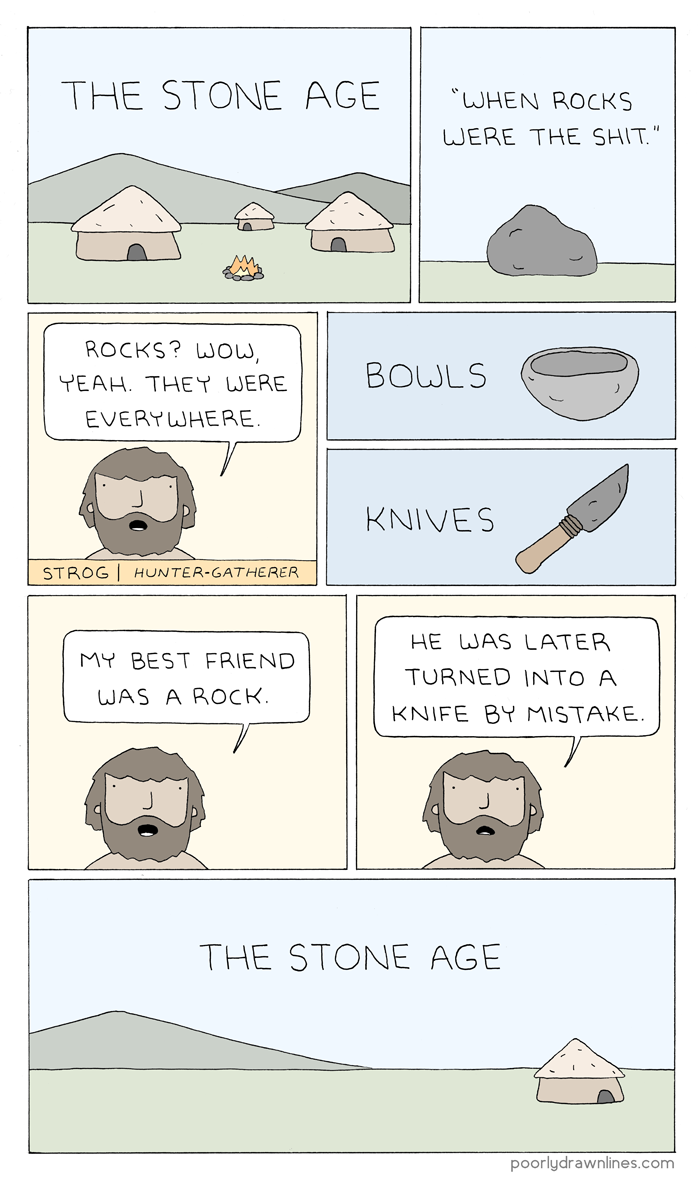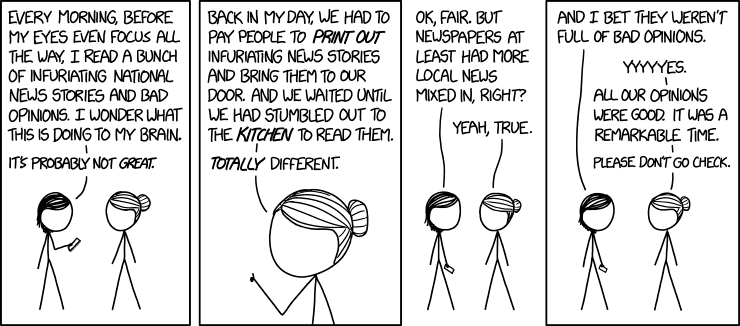The post Two Mommies appeared first on Fowl Language Comics.
Adam Victor Brandizzi
Shared posts
Saturday Morning Breakfast Cereal - State of the Union

Click here to go see the bonus panel!
Hovertext:
I'm gonna start a graphic novel about a world where there are no crowds, buildings, bicycles, cars, or horses.
Today's News:
Cat Zen Tip 4

And more zen.
Saturday Morning Breakfast Cereal - Help
Photo
Adam Victor BrandizziNobody does, child, nobody does.
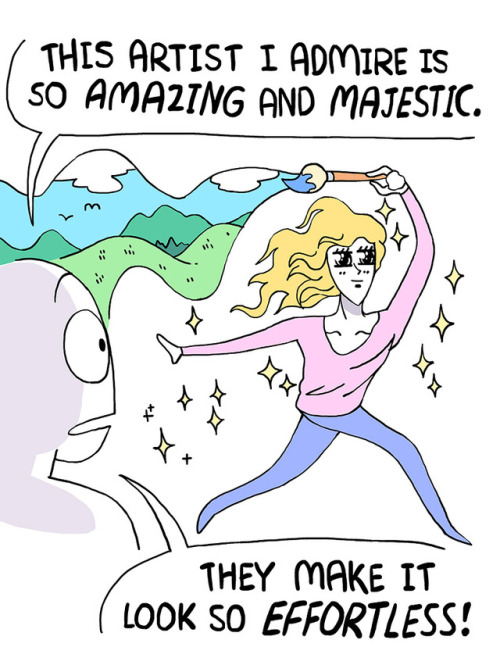
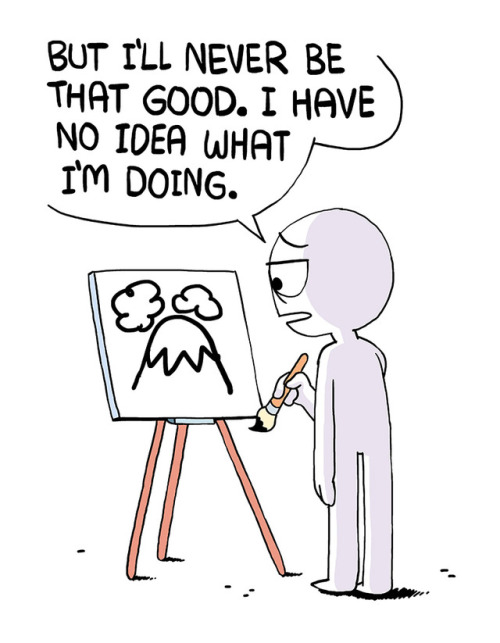
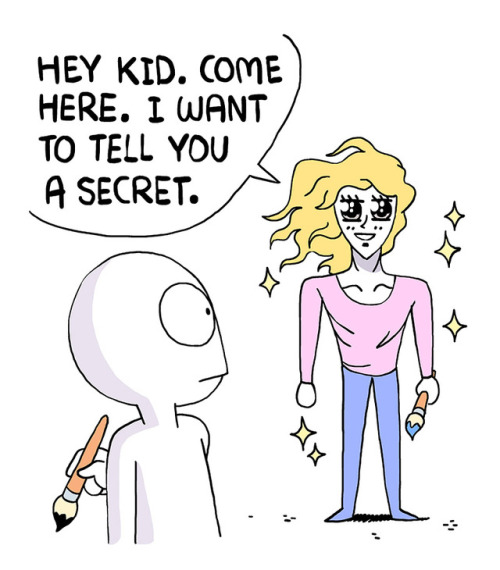
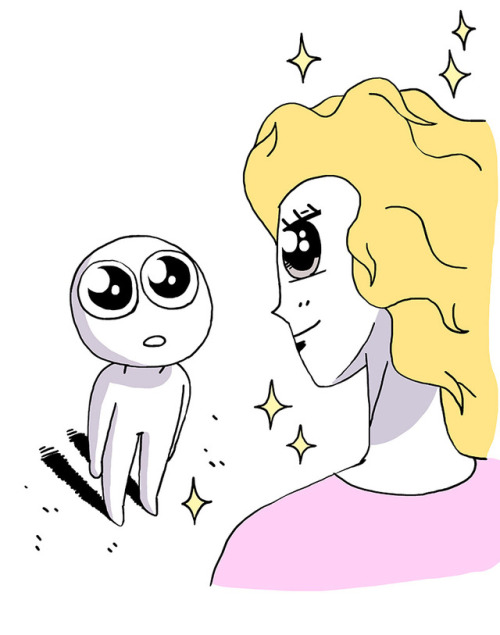

Saturday Morning Breakfast Cereal - Quantum Bits
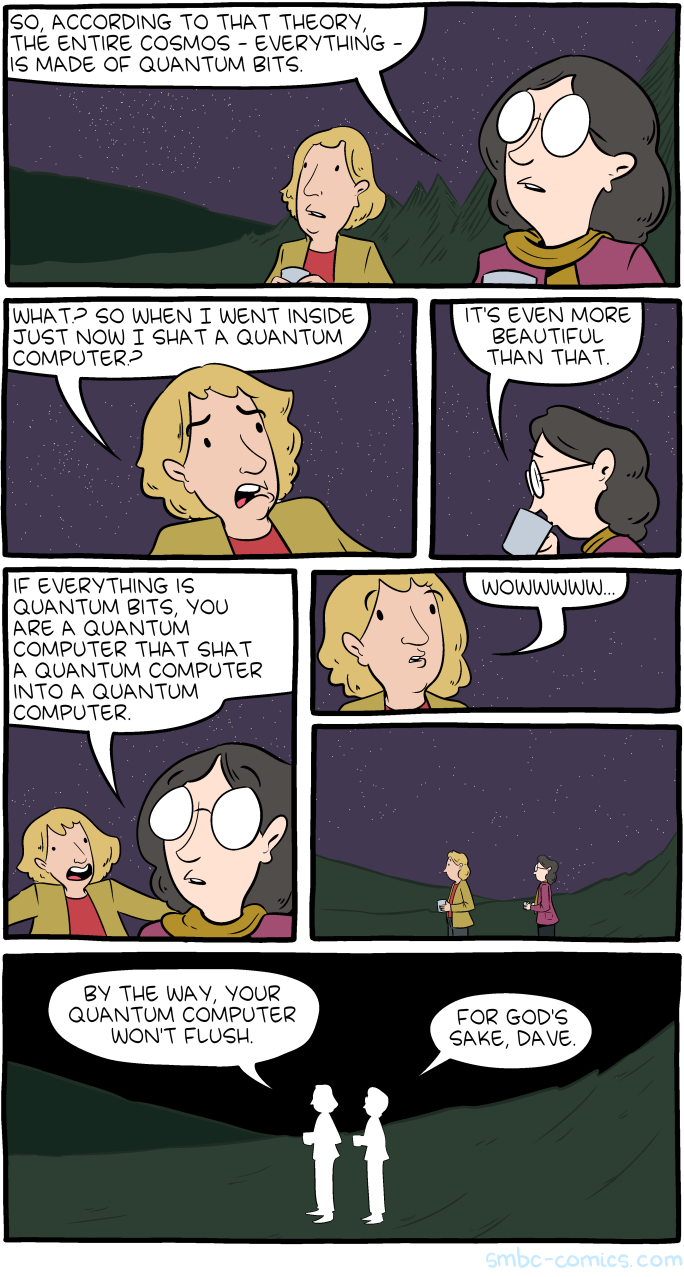
Click here to go see the bonus panel!
Hovertext:
The more elegant the physics theory, the more it is ruined by butts.
New comic!
Today's News:
shifting priorities and digital transformation
Adam Victor BrandizziAlso valid for product management (and all things software engineering)
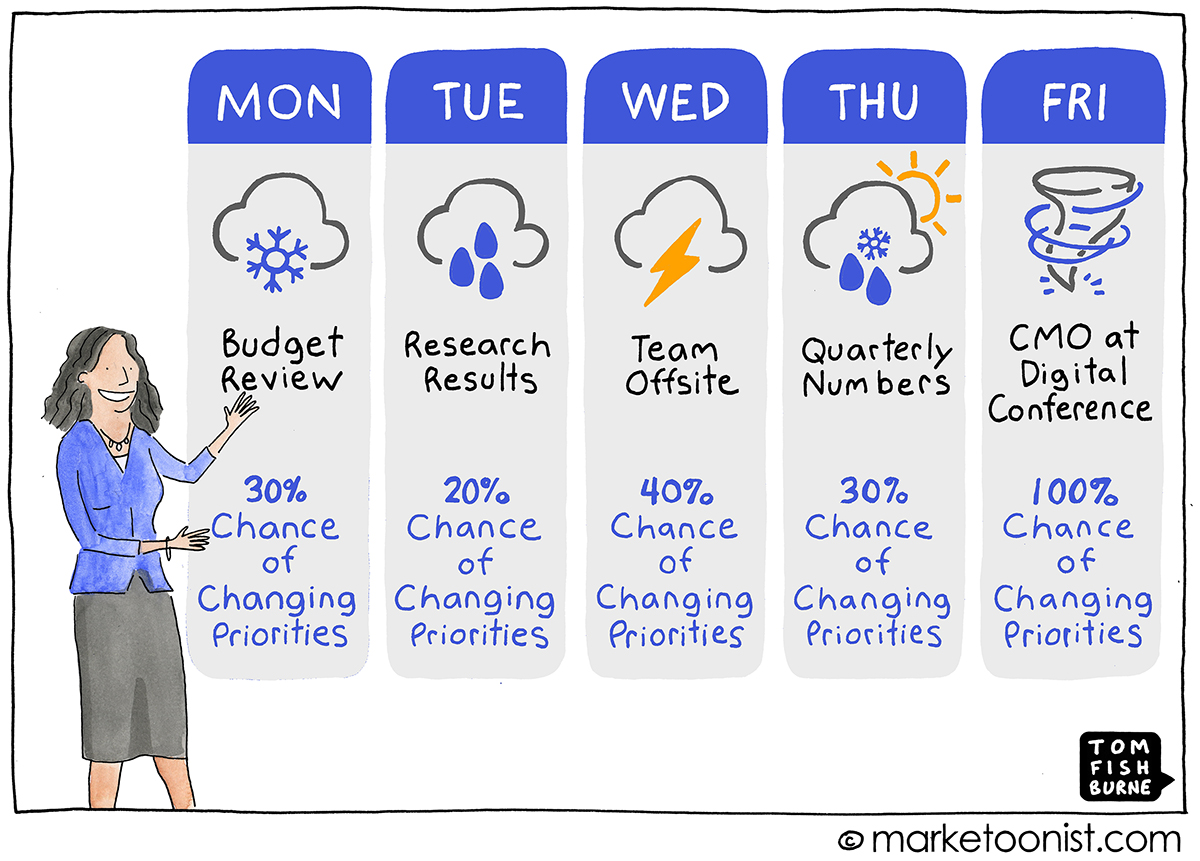
We’re all working in a time of perennial change. Marketing priorities are frequently a moving target. This climate can create a sort of organizational Attention-Deficit Disorder.
Nowhere is this more prevalent than in the push toward digital transformation. Gartner released a study a few weeks ago that found senior executives were rapidly shifting priorities to embrace digital business.
And yet, while adapting to changing circumstances is essential, continually shifting priorities takes a toll. It’s hard to prioritize when everything is a priority. A shift at the leadership team level can have a bullwhip effect on the rest of the organization.
And, as Gartner noted in a separate study, many businesses confuse digital transformation with prioritizing isolated digital projects. As Gartner’s Val Sribar put it:
“Many businesses are stuck running digital projects. Some of them are very large, but digital projects are not a digital business.”
Here are a few related cartoons I’ve drawn over the years.
“Digital Transformation” November 2016

“Shiny Object Syndrome” January 2015

“Organizational Bullwhip” July 2008
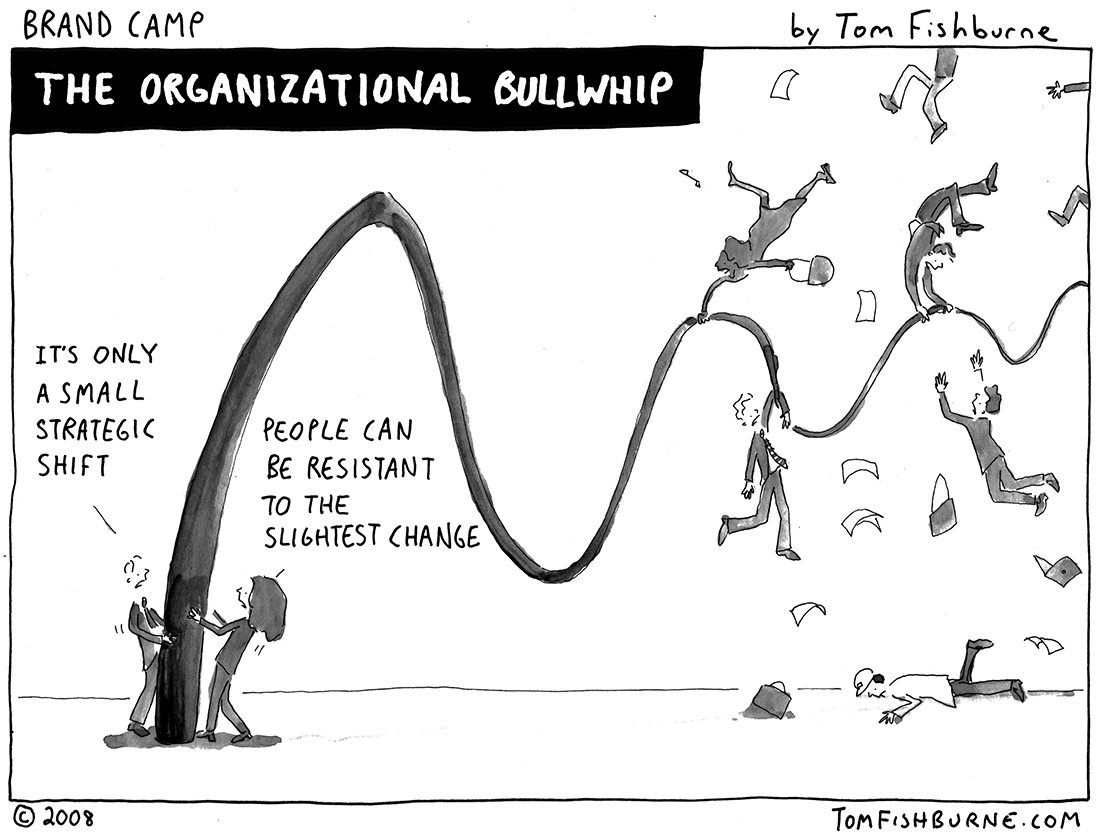
Acidente de laboratório no Ceará poderá amenizar a poluição em todo o mundo - TecMundo
“Eu estava estudando sobre a cristalização de polímeros e tive que deixar um material na estufa do laboratório. Aí eu comecei a conversar com meus colegas e, quando me dei conta, vi que estufa estava pegando fogo”. Esse acidente que Myllena da Silva, de 19 anos, descreveu ao TecMundo durante a Intel ISEF 2018 – a maior feira de ciências do mundo – aconteceu em um dos laboratórios de química do Instituto Federal do Ceará, mas seus desdobramentos poderão ajudar a combater a poluição no mundo inteiro.
Será possível evitar que navios petroleiros contaminem o mar com resquícios de óleo que ficam em seu lastro
Com o trabalho que Myllena desenvolveu a partir do que descobriu com esse acidente, será possível evitar que navios petroleiros contaminem o mar com resquícios de óleo que ficam em seu lastro. E com a ajuda de uma bactéria, a estudante também consegue criar um ciclo fechado para reciclagem de isopor, transformando o produto em sua própria matéria prima depois de alguns passos.
Mas vamos começar pelo início. Ao fazer um exercício prático com polímeros, Myllena acabou criando “cristais de isopor”. “Eu levei o material em chamas rapidamente para a pia e, quando joguei água, eu causei um choque térmico, e isso gerou uma superfície lisa no recipiente do material, que eu agora chamo de cristal liso”, contou a estudante. Por tocar fogo na estufa do laboratório, Myllena ficou proibida de usar as instalações por 30 dias. “Nesse intervalo, eu fiquei aprendendo mais sobre os polímeros e alguns problemas relacionados a eles”, disse.
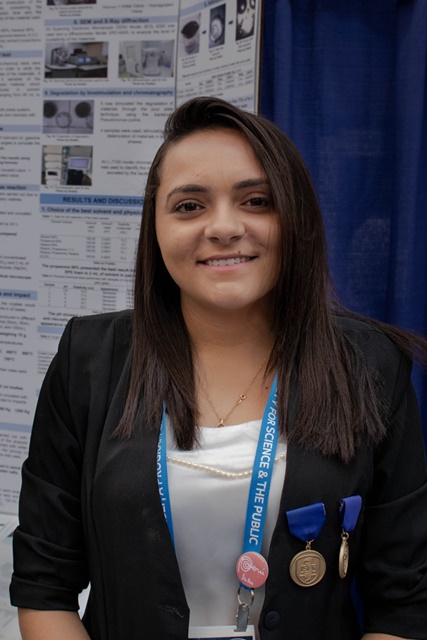 Myllena da Silva foi finalista da Intel ISEF pela segunda vez e, neste ano, foi duplamente premiada
Myllena da Silva foi finalista da Intel ISEF pela segunda vez e, neste ano, foi duplamente premiada
Quando voltou, ela percebeu que esses cristais lisos repeliam líquidos e imaginou que poderia usar esse elemento para evitar o vazamento de óleo em navios petroleiros. Segundo os testes dela, o material realmente funciona para este fim.
Com um outro procedimento, Myllena também conseguiu transformar isopor em um material cristalino, mas dessa vez poroso. Colocando nisso uma bactéria conhecida por degradar isopor e plásticos, ela percebeu que o processo de decomposição bacteriano se dava muito mais rápido a partir dos cristais. Naturalmente, essas criaturas levariam mais de 150 anos para devorar o isopor tradicional, mas para comer os cristais porosos, elas levaram apenas sete meses.
Por curiosidade, eu fui verificar o que as bactérias excretavam, e descobri que era o óleo de etileno, que é a matéria prima do isopor. Então eu descobri um ciclo fechado
O mais curioso de tudo isso foi a análise do subproduto gerado pela degradação dos cristais pelas bactérias, a excreção delas após comerem o isopor cristalizado. “Por curiosidade, eu fui verificar o que as bactérias excretavam, e descobri que era o óleo de etileno, que é a matéria prima do isopor. Então eu descobri um ciclo fechado”, explicou a jovem.
Esse ciclo fechado acontece basicamente pelo fato de ela utilizar o produto industrializado, o isopor, para produzir a sua própria matéria prima após alguns processamentos. Em outras palavras, é possível recolher isopor descartado incorretamente no meio ambiente, ou mesmo fazer uma coleta seletiva do material nas cidades, e reciclá-lo em sua totalidade.
Myllena da Silva apresentou seu trabalho na Intel ISEF 2018, que aconteceu em Pittsburgh, EUA, na última semana. Por conta disso, ela levou dois prêmios especiais na feira, tendo sido convidada a estudar em duas universidades norte-americanas (Universidade do Arizona e Universidade Estadual do Arizona) diferentes com bolsas integrais.
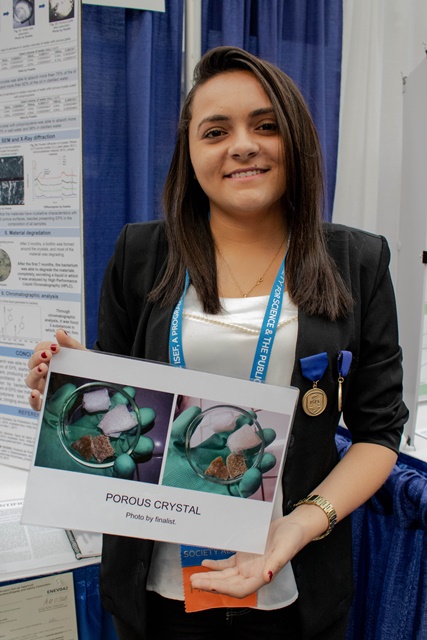 Por conta de sua descoberta, a estudante poderá escolher em qual universidade do Arizona, EUA, poderá estudar
Por conta de sua descoberta, a estudante poderá escolher em qual universidade do Arizona, EUA, poderá estudar
“É algo inacreditável. Uma semana atrás, eu estava dizendo que não sabia falar inglês e que eu talvez não conseguisse apresentar meu trabalho nessa língua. Agora subir ao palco da maior feira de ciências do mundo e ser premiada com duas bolsas de estudo de universidades diferentes é algo inacreditável”, disse Myllena após a premiação da ISEF 2018.
Maracujá para a indústria têxtil
Outra estudante brasileira que mostrou um trabalho focado no combate à poluição durante a Intel ISEF 2018 foi Juliana Estradioto. Ela tem 17 anos e cursa o ensino médio no Instituto Federal do Rio Grande do Sul. Diferente de Myllena, contudo, Juliana resolveu processar resíduos agroindustriais produzidos em sua cidade, Osório-RS. Estamos falando de palha e arroz, semente e casca de maracujá, além de outros.
Com a semente de maracujá em especial, Juliana conseguiu resultados impressionantes. Ela utilizou uma espécie de farinha feita com isso para neutralizar resíduos tóxicos produzidos pela indústria têxtil. Juliana chama esses resíduos de “efluente”, a água que sai da linha de produção de tecido misturada com tintura usada para dar cor às nossas roupas.
Quando descartado diretamente em rios sem tratamento, esse efluente pode contaminar a água e impedir que ela seja naturalmente oxigenada. Com isso, nenhum animal ou planta aquática pode sobreviver. Existe uma forma de tratar esse efluente para se obter água “limpa” novamente, mas o procedimento á caro.
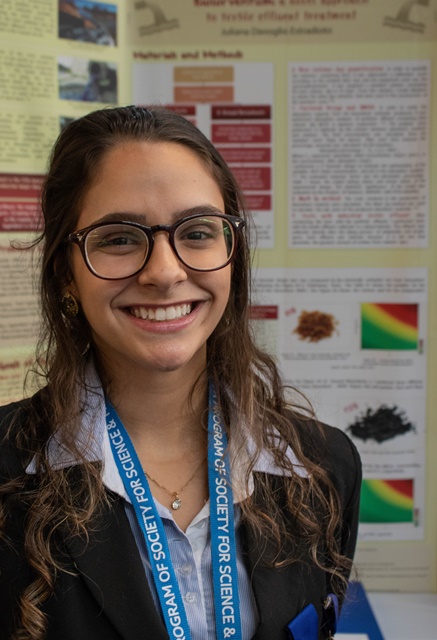 Juliana ganhou uma bolsa para estudar na Universidade do Arizona, a mesma que também premiou Myllena
Juliana ganhou uma bolsa para estudar na Universidade do Arizona, a mesma que também premiou Myllena
É aí que entra a semente de maracujá. Com um “biossorvente” produzido a partir desse material orgânico, Juliana conseguiu absorver 97% da coloração/tintura do efluente, transformando o material em água praticamente limpa, que poderia ser utilizada novamente na indústria. Só com a produção de maracujá da região onde a estudante mora, seria possível tratar 50 bilhões de litros de efluente. Além disso, esse processo seria 39% mais barato que o tratamento convencional.
Para mim, a parte mais importante do meu projeto é poder usar os resíduos agroindustriais da minha cidade para fazer o tratamento do efluente que é gerado no meu estado
“Para mim, a parte mais importante do meu projeto é poder usar os resíduos agroindustriais da minha cidade para fazer o tratamento do efluente que é gerado no meu estado”, contou Juliana ao TecMundo. “O que mais me deixa feliz é poder contribuir para solucionar esses problemas ambientais”.
Mas, infelizmente, a motivação de Juliana em buscar uma solução para o efluente têxtil tem origem em uma tragédia. Em 2006, centenas de toneladas de peixes apareceram mortos da noite para o dia no Rio dos Sinos, no RS. Posteriormente, as autoridades determinaram que a causa foi o descarte de esgoto doméstico e, principalmente, de efluente têxtil no rio. Na época, o Rio dos Sinos fornecia água potável para mais de 1 milhão de pessoas. Para a estudante, esse é um dos problemas que a “Fast Fashion” pode trazer para o meio ambiente.
Por sua pesquisa, Juliana Estradioto também foi premiada na ISEF 2018 com uma bolsa integral da Universidade do Arizona, nos EUA.
O TecMundo viajou para Pittsburgh a convite da Intel.
Cupons de desconto TecMundo:
05/25/18 PHD comic: 'Summer'
| Piled Higher & Deeper by Jorge Cham |
www.phdcomics.com
|
|
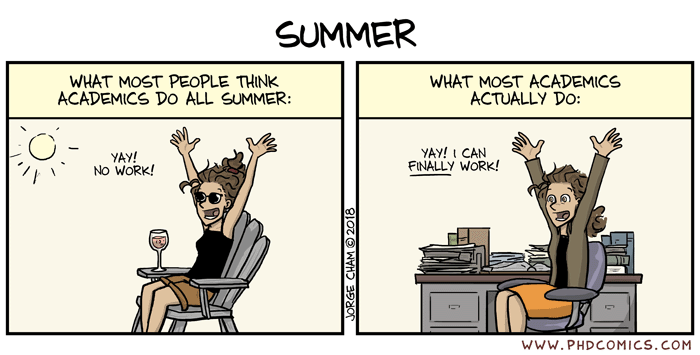 |
||
|
title:
"Summer" - originally published
5/25/2018
For the latest news in PHD Comics, CLICK HERE! |
||
Saturday Morning Breakfast Cereal - Sadism
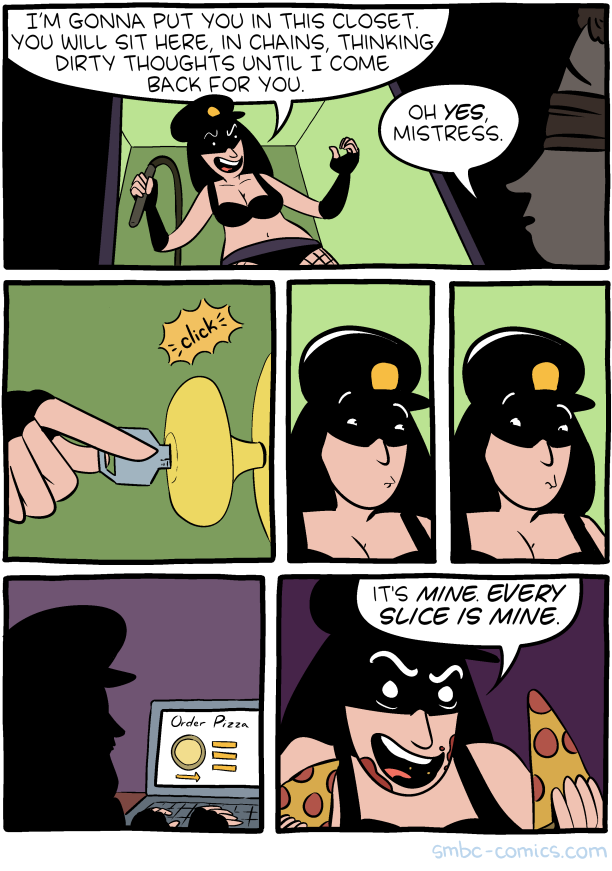
Click here to go see the bonus panel!
Hovertext:
Later, she forces him to look at the empty pizza box and eat the pepperoncinis.
New comic!
Today's News:
Saturday Morning Breakfast Cereal - Frequency
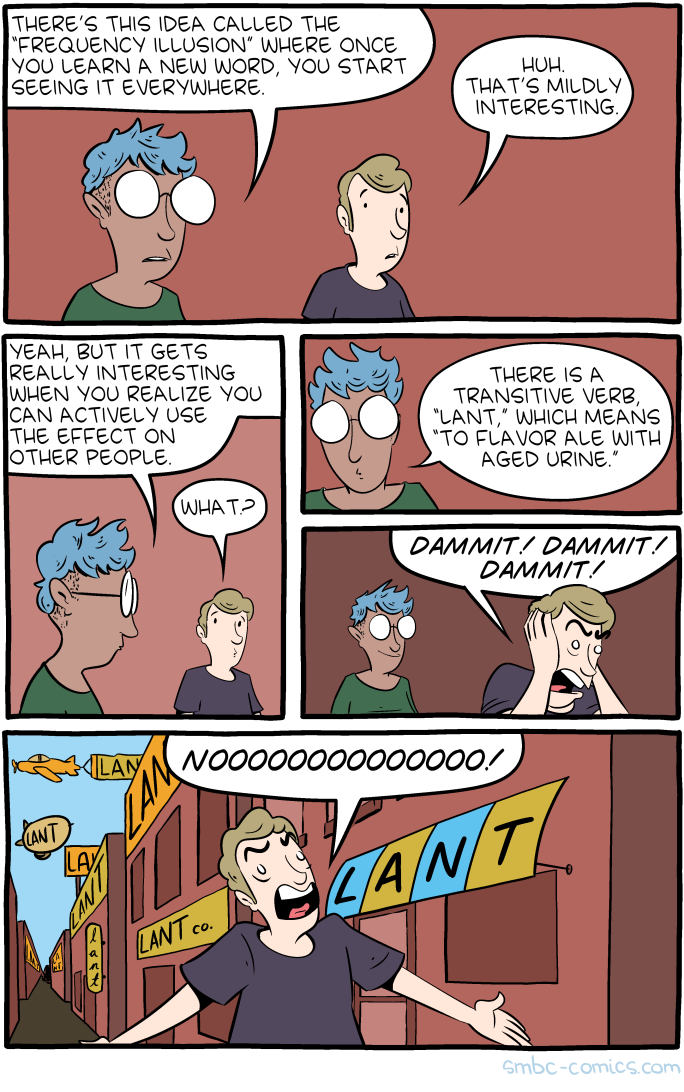
Click here to go see the bonus panel!
Hovertext:
I found out about 'lant' on the lovely podcast, Lexicon Valley, by the always-brilliant John McWhorter.
New comic!
Today's News:
Look it up.
A Story of a Fuck Off Fund - The Billfold
Adam Victor BrandizziI don't intent to recommend this article to anybody because, well, I'm not in a position to do it empathetically BUT it seems so good to me I believe it should be more known.
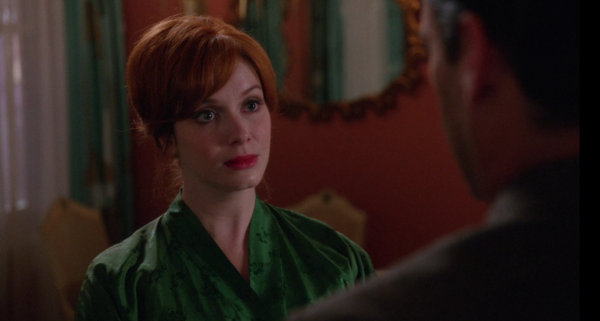
You’re telling your own story: You graduated college and you’re a grown-ass woman now. Tina Fey is your hero; Beyoncé, your preacher.
You know how to take care of you. You’ve learned self-defense. If any man ever hit you, you’d rip his eyes out. You’ve seen Mad Men, and if anyone ever sexually harassed you at work, you’d tell him to fuck right off, throw your coffee in his face, and wave two middle fingers as you marched out the door.
You get your first internship. You get your first credit card. You get to walk into Nordstrom, where your mom would never take you, and congratulate yourself with one fabulous black leather skirt, and the heels to match.
Your car? It’s the car of a college student. You get a lease, graduate from the rusted Civic to last year’s Accord.
You get your first student loan bill, and look at all those numbers.
Your life turns into a stock photo tagged “young professionals”: you and your new work friends, hanging out at the bar across the street from the office. The cocktails cost twice as much as you paid when you still measured time by semesters and nights by cans of PBR.
The college boyfriend gets serious. You move into his place, spruce it up by buying your first coffee table together. Ikea lets you put half on your newest credit card.
Your internship ends before you find a permanent job. You pay minimum payments, then max out your cards again buying two days’ worth of groceries and filling your gas tank half way.
Your bank app upgrades to a new feature that combines all your balances — the shiny Nordstrom card with the Visa and the Chase Freedom you were only supposed to use for emergencies — and tells you that somehow you owe people seven thousand dollars.
Your boyfriend offers to cover the rent for a while. You get a job a few months later, but you’re that many loan payments behind. Your first paycheck feels like a breath of air that gets sucked right out of your lungs.
Your new boss, who seems nice, calls you in his office, shows you a picture of his kids. He jokes about his son, then as you’re laughing, he puts his hand on your arm, gives you a little squeeze. You smile it off.
You wait to pay the electric bill while you’re gathering up the half you owe, and the lights go out. On your phone you see the email about the $50 late fee. Your boyfriend asks how you could be so stupid. “I am not stupid,” you say. You would never be with someone who called you names, but you would never be able to make first, last, and deposit right now, either.
You say yes to payday P.F. Chang’s with your new co-workers, because you want to make friends, your turkey sandwich sounds boring, and what’s one more charge? You buy a halter dress you know you can’t afford, because it makes you look like the successful young woman you want everyone to think you are.
Your boss tells you that you look nice in that dress, asks you to do a spin. Just to get the moment over with, you do.
Your boyfriend asks you how much you paid for it, says it makes you look chubby. You lock yourself in the bathroom until he bangs on the door so hard you think he must have hurt himself. After he falls asleep, you search Craigslist for places, and can’t believe how expensive rent’s gotten around town. You erase your Internet history and go to sleep.
A few weeks later, your boss calls a one-on-one in his office, walks up behind you, and stands too close. His breath fogs your neck. His hand crawls up your new dress. You squirm away. He says, “Sorry, I thought…”
You know what to do. You’re just shocked to find you’re not doing it. You are not telling him to fuck off. You are not storming out. All you’re doing is math. You have $159 in the bank and your car payment and your maxed out credit cards and you’ll die before you ask your dad for a loan again and it all equals one thought: I need this job.
“It’s ok,” you hear your voice saying. “Just forget it.” You scurry out of the room, survey the office half full of women, and wonder how many of them have secrets like the one you’re about to keep.
At the apartment, your best guy friend calls. After you hang up, your boyfriend says you laugh too much with him, that you’re flirting with him, probably sleeping with him. You say it’s not like that. You yell, he yells. You try to leave, he blocks your way. When you struggle to get by, he grabs your wrist in the exact way they pretended to in self-defense class, and you know to go for the eyes, but you don’t know how to go for his eyes. He yanks you back until you fall and crack the coffee table.
He seems so sorry, cries, even, so that night you lie down in the same bed. You stare up at the dark and try to calculate how long it would take you to save up the cash to move out. Telling yourself that he’s sorry, convincing yourself it was an accident, discounting this one time because he didn’t hit you, exactly, seems much more feasible than finding the money, with what you owe every month. The next time you go out as a couple, his arm around your shoulders, you look at all the other girlfriends and imagine finger-sized bruises under their long sleeves.
Wait. This story sucks. If it were one of those Choose Your Own Adventures, here’s where you’d want to flip back, start over, rewrite what happens to you.
You graduated college and you’re a grown-ass woman now. Tina Fey is your hero. Beyoncé, your preacher.
If any man ever hit you, if anyone ever sexually harassed you, you’d tell him to fuck right off. You want to be, no, you will be the kind of woman who can tell anyone to fuck off if a fuck off is deserved, so naturally you start a Fuck Off Fund.
To build this account, you keep living like you lived as a broke student. Drive the decade-old Civic even after the fender falls off. Buy the thrift store clothes. You waitress on Saturdays, even though you work Monday through Friday. You make do with the garage sale coffee table. It’s hard, your loan payments suck, but you make girl’s night an at-home thing and do tacos potluck.
You save up a Fuck Off Fund of $1,000, $2,000, $3,000, then enough to live half a year without anyone else’s help. So when your boss tells you that you look nice, asks you to do a spin, you say, “Is there some way you need my assistance in the professional capacity or can I go back to my desk now?”
When your boyfriend calls you stupid, you say if he ever says that again, you’re out of there, and it’s not hard to imagine how you’ll accomplish your getaway.
When your boss attempts to grope you, you say, “Fuck off, you creep!” You wave two middle fingers in the air, and march over to HR. Whether the system protects you or fails you, you will be able to take care of yourself.
When your boyfriend pounds the door, grabs your wrist, you see it as the red flag it is, leave a post-it in the night that says, “Fuck off, lunatic douche!” You stay up in a fancy hotel drinking room service champagne, shopping for apartments, and swiping around on Tinder.
Once your Fuck Off Fund is built back up, with your new, better job, you pay cash for the most bad ass black leather skirt you can find, upgrade to the used but nicer convertible you’ve always wanted, and start saving to go to Thailand with your best friend the next summer.
Yes, that’s a better story.
It’s a story no one ever told me.
It’s the kind I’d hope for you.

Paulette Perhach has been published at Salon.com, The Journal, and various other newspapers and magazines. She collaborated with the Hugo House writing center to produce The Writer’s Welcome Kit, an online course that helps new writers figure out where to start. Follow her on Twitter or Facebook if you’d like.
Support The Billfold on Patreon
The Billfold continues to exist thanks to support from our readers. Help us continue to do our work by supporting us on Patreon.
How to Be a Good Friend
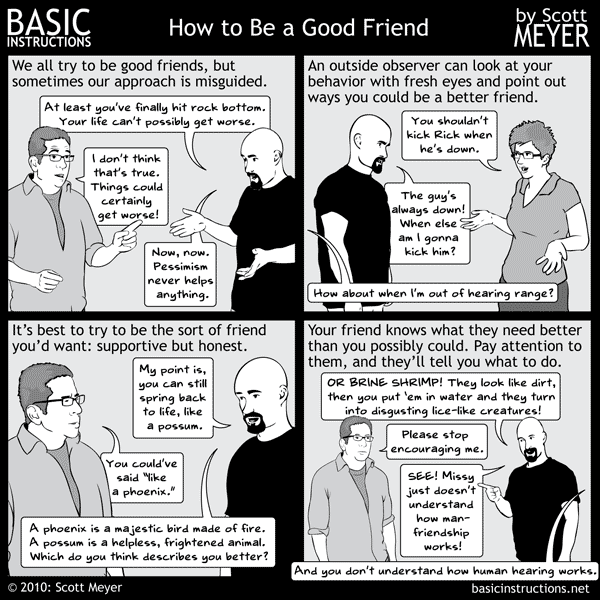
There is something to be said for laughing at how bad things have gotten. Rick understands this.
When I was a comedian, I was accused of being a masochist, because the worse the setup, and the more uninterested the audience, the funnier I found everything. Many was the night that my opening act would be standing in a corner of the bar with no raised platform, a single track-light shining directly in his face, and Radio Shack’s least expensive microphone in his hand. He would tell a joke, receive an indifferent silence from the audience and the sound of me laughing diabolically in the distance, which would have made sense if not for the fact that I was going to have to go on right after him, and do twice as much time.
As always, thanks for using my Amazon Affiliate links (US, UK, Canada).
Saturday Morning Breakfast Cereal - Responsible
.png)
Click here to go see the bonus panel!
Hovertext:
I swear, I SWEAR responsibleness is a word. I didn't want to use 'responsibility' because it has an additional sense of 'obligation.' That is, you can be responsible and lack responsibilities and you can be irresponsible and have many responsibilities. There. Now that we're pretty deep in this hover text, how are you? I'm currently really enjoying 'The Cruel Sea' by Monsarrat. It's remarkable how many great novels fail to become 'classics.' I suspect in this c
New comic!
Today's News:
The Aquarium | The New Yorker
Adam Victor BrandizziOne of the greatest and saddest essays I've read.

On July 15, 2010, my wife, Teri, and I took our younger daughter, Isabel, to the doctor for a regular checkup. She was nine months old and appeared to be in perfect health. Her first teeth had come in, and she was now regularly eating with us at the dinner table, babbling and shovelling rice cereal into her mouth. A cheerful, joyous child, she had a fondness for people, which she had not, the joke went, inherited from her congenitally grumpy father.
Teri and I always went together to our children’s doctor’s appointments, and this time we also took Ella, Isabel’s big sister, who was almost three. The nurse at Dr. Armand Gonzalzles’s office took Isabel’s temperature and measured her weight, height, and head circumference, and Ella was happy that she didn’t have to undergo the same ordeal. Dr. G., as we called him, listened to Isabel’s breathing and checked her eyes and ears. On his computer, he pulled up Isabel’s development chart: her height was within the expected range; she was a little underweight. Everything seemed fine, except for her head circumference, which was two measures of standard deviation above her last measurement. Dr. G. was concerned. Reluctant to send Isabel for an MRI, he scheduled an ultrasound exam for the following day.
Back at home that evening, Isabel was restless and cranky; she had a hard time falling and staying asleep. If we hadn’t gone to Dr. G.’s, we would have assumed that she was simply overtired, but now we had a different interpretative framework, one founded on fear. Later that night, I took Isabel out of our bedroom (she always slept with us) to calm her. In the kitchen, I sang her my entire repertoire of lullabies: “You Are My Sunshine,” “Twinkle, Twinkle, Little Star,” and a Mozart piece I’d learned as a child, whose lyrics in Bosnian I miraculously remembered. Singing the three lullabies in a relentless loop usually worked, but this time it took a while before she laid her head on my chest and quieted down. When she did this, it felt as though she were somehow comforting me, telling me that everything would be all right. Worried as I was, I imagined a future in which I would one day recall that moment and tell other people how Isabel had calmed me down. My daughter, I would say, took care of me, and she was only nine months old.
The following morning, Isabel underwent an ultrasound exam of her head, crying in Teri’s arms throughout the procedure. Shortly after we got home, Dr. G. called to tell us that Isabel was hydrocephalic and we needed to go to an emergency room immediately—it was a life-threatening situation.
The examination room in the E.R. at Chicago’s Children’s Memorial Hospital was kept dark, as Isabel was about to have a CT scan and the doctors were hoping she’d fall asleep so that they wouldn’t have to drug her. But she wasn’t allowed to eat, because there was the possibility of a subsequent MRI, and she kept crying from hunger. A resident gave her a colorful whirligig and we blew at it to distract her. She finally fell asleep. As the scan was performed, we waited for something to reveal itself, too afraid to imagine what it might be.
Dr. Tadanori Tomita, the head of pediatric neurosurgery, read the CT scans for us: the ventricles of Isabel’s brain were enlarged, full of fluid. Something was blocking the draining channels, Dr. Tomita said, possibly “a growth.” An MRI was urgently needed.
Teri held Isabel in her arms as the anesthetics were administered, then we handed her over to the nurses for an hour-long MRI. The cafeteria in the hospital’s basement was the saddest place in the world, with its grim neon lights and gray tabletops and the diffuse foreboding of those who had stepped away from suffering children to have a grilled cheese sandwich. We didn’t dare speculate about the results of the MRI; we were anchored in the moment, which, terrifying as it was, hadn’t yet extended into a future.
Called up to medical imaging, we ran into Dr. Tomita in the overlit hallway. “We believe,” he said, “that Isabel has a tumor.” He showed us the MRI images on his computer: right at the center of Isabel’s brain, lodged between the cerebellum, the brain stem, and the hypothalamus, was a round thing. It was the size of a golf ball, Dr. Tomita suggested, but I’d never been interested in golf and couldn’t envision what he meant. He would remove the tumor, and we would find out what kind it was only after the pathology report. “But it looks like a teratoid,” he said. I didn’t comprehend the word “teratoid,” either—it was beyond my experience, belonging to the domain of the unimaginable and incomprehensible, the domain into which Dr. Tomita was now guiding us.
Isabel was asleep in the recovery room, motionless, innocent. Teri and I kissed her hands and her forehead and wept through the moment that divided our life into before and after. Before was now and forever foreclosed, while after was spreading out, like an exploding twinkle star, into a dark universe of pain.
Still unsure of the word that Dr. Tomita had uttered, I looked up brain tumors on the Internet, and found an image of a tumor that was nearly identical to Isabel’s. Its full name was, I read, “atypical teratoid/rhabdoid tumor” (A.T.R.T.). It was highly malignant and exceedingly rare, occurring in only three in a million children and representing about three per cent of pediatric cancers of the central nervous system. The survival rate for children younger than three was less than ten per cent. There were even more discouraging statistics available for me to ponder, but I recoiled from the screen, deciding instead to talk to and trust only Isabel’s doctors; never again would I research her condition on the Internet. Already I understood that it would be necessary to manage our knowledge and our imaginations if we were not to lose our minds.
On Saturday, July 17th, Dr. Tomita and his neurosurgical team implanted an Ommaya reservoir in Isabel’s head, to help drain and relieve the pressure from the accumulated cerebrospinal fluid. When Isabel was returned to her hospital room on the neurosurgery floor, she kicked off her blanket, as she was wont to do; we took this as an encouraging sign, a hopeful first step on a long journey. On Monday, she was released from the hospital to wait at home for the surgery that would remove the tumor, which was scheduled for the end of the week. Teri’s parents were in town, because her sister had given birth to her second son on the day of Isabel’s checkup—too concerned about Isabel, we had hardly paid attention to the new arrival in the family—and Ella had spent the weekend with her grandparents, barely noticing the upheaval or our absence. Tuesday afternoon was sunny, and we all went out for a walk, Isabel strapped to Teri’s chest. That night, we rushed to the emergency room, because Isabel had developed a fever; it was likely that she had an infection, which is not uncommon after the insertion of a foreign object—in this case, the Ommaya—in a child’s head.
She received antibiotics and underwent a scan or two; the Ommaya was removed. On Wednesday afternoon, I left the hospital and went home to be with Ella, as we’d promised to take her to our neighborhood farmers’ market. It was essential, in the ongoing catastrophe, that we keep our promises. Ella and I bought blueberries and peaches; on the way home, we picked up some first-rate cannoli from our favorite pastry shop. I talked to Ella about Isabel’s being sick, about her tumor, and told her that she would have to stay with Grandma that night. She didn’t complain or cry; she understood, as well as any three-year-old could, the difficulty of our predicament.
As I was walking to the car, cannoli in hand, to go back to the hospital, Teri called. Isabel’s tumor was hemorrhaging; emergency surgery was required. Dr. Tomita was waiting to talk to me before going into the operating room. It took me about fifteen minutes to get to the hospital, through traffic that existed in an entirely different space-time, where people did not rush while crossing the street and no infant’s life was in danger, where everything turned quite leisurely away from disaster.
In the hospital room, the box of cannoli still in my hand, I found Teri weeping over Isabel, who was deathly pale. Dr. Tomita was there, images of our daughter’s hemorrhage already pulled up on the screen. It seemed that, once the fluid had drained, the tumor had expanded into the vacated space and its blood vessels had begun to burst. Immediate removal of the tumor was the only hope, but there was a distinct risk of Isabel’s bleeding to death. A child of her age had just over a pint of blood in her body, Dr. Tomita told us, and continuous transfusion might not suffice.
Before we followed Isabel into the pre-op, I put the cannoli in the fridge that was in her room. The selfish lucidity of that act produced an immediate feeling of guilt. Only later would I understand that that absurd act was related to a desperate form of hope: the cannoli might be necessary for our future survival.
The surgery was expected to last between four and six hours; Dr. Tomita’s assistant would keep us updated. We kissed Isabel’s parchment-pale forehead and watched her being wheeled into the unknown by a gang of masked strangers. Teri and I returned to Isabel’s room to wait. We alternately wept and were silent. We shared some cannoli to keep ourselves going—for days, we’d had very little food or sleep. The lights in the room were dimmed; we were on a bed behind a curtain, and for some reason no one bothered us. We were far away from the world of farmers’ markets and blueberries, where children were born and lived, and where grandmothers put granddaughters to sleep. I had never felt as close to another human being as I did that night to my wife.
Sometime after midnight, Dr. Tomita’s assistant called to say that Isabel had made it through the surgery. Dr. Tomita thought he’d removed most of the tumor. Isabel was doing well and would soon be transferred to the Intensive Care Unit, he said, where we could see her. I remember that moment as a relatively happy one: Isabel was alive. Only the immediate outcome was relevant; all we could hope for was to reach the next step, whatever it was. In the I.C.U., we found her entangled in a web of I.V.s, tubes, and wires, paralyzed by Rocuronium (called “the rock” by everyone there), which had been administered to prevent her from ripping out her breathing tubes. We spent the night watching her, kissing the fingers on her limp hand, reading or singing to her. The next day, I set up an iPod dock and played music, not only in the willfully delusional belief that music would be good for a painful, recovering brain but also to counter the soul-crushing hospital noise: the beeping of monitors, the wheezing of respirators, the indifferent chatter of nurses in the hallway, the alarm that went off whenever a patient’s condition abruptly worsened. To the accompaniment of Bach’s cello suites or Charles Mingus’s piano pieces, I registered every dip of Isabel’s heart rate, every change in her blood pressure. I couldn’t take my eyes off the cruelly fluctuating numbers on the monitors, as though the sheer act of staring could influence the outcome.
There’s a psychological mechanism, I’ve come to believe, that prevents most of us from imagining the moment of our own death. For if it were possible to imagine fully that instant of passing from consciousness to nonexistence, with all the attendant fear and humiliation of absolute helplessness, it would be very hard to live. It would be unbearably obvious that death is inscribed in everything that constitutes life, that any moment of your existence may be only a breath away from being the last. We would be continuously devastated by the magnitude of that inescapable fact. Still, as we mature into our mortality, we begin to gingerly dip our horror-tingling toes into the void, hoping that our mind will somehow ease itself into dying, that God or some other soothing opiate will remain available as we venture into the darkness of non-being.
But how can you possibly ease yourself into the death of your child? For one thing, it is supposed to happen well after your own dissolution into nothingness. Your children are supposed to outlive you by several decades, during the course of which they live their lives, happily devoid of the burden of your presence, and eventually complete the same mortal trajectory as their parents: oblivion, denial, fear, the end. They’re supposed to handle their own mortality, and no help in that regard (other than forcing them to confront death by dying) can come from you—death ain’t a science project. And, even if you could imagine your child’s death, why would you?
But I’d been cursed with a compulsively catastrophic imagination, and had often involuntarily imagined the worst. I used to picture being run over by a car whenever I crossed the street; I could actually see the layers of dirt on the car’s axis as its wheel crushed my skull. When I was stuck on a subway with all the lights out, I’d envision a deluge of fire advancing through the tunnel toward the train. Only after I met Teri did I manage to get my tormentful imagination somewhat under control. And, after our children were born, I learned to quickly delete any vision I had of something horrible happening to them. A few weeks before Isabel’s cancer was diagnosed, I’d noticed that her head seemed large and somewhat asymmetrical, and a question had popped into my mind: What if she has a brain tumor? But I banished the thought almost immediately. Even if you could imagine your child’s grave illness, why would you?
A couple of days after Dr. Tomita had operated to remove the tumor, an MRI showed that there was still a piece left in Isabel’s brain. The more cancer was taken out, the better the prognosis would be, so Isabel had to undergo another surgery, after which she returned to the I.C.U. Then, after she was transferred from the I.C.U. to neurosurgery, it was discovered that her cerebrospinal fluid was still not draining: an external ventricular drain was put in, and a passage for drainage was surgically opened in her brain. She had fever again. The E.V.D. was taken out; her ventricles were enlarged and full of fluid, to the point of endangering her life, and her blood pressure was dropping. Undergoing yet another emergency scan, face upward in the MRI tunnel, she nearly choked, the vomit bubbling out of her mouth. Finally, a shunt was surgically implanted, allowing the fluid to drain directly into her stomach.
In less than three weeks, Isabel had undergone two brain resections—in which her cerebral hemispheres were parted to allow Dr. Tomita to access the region between the stem, the pineal gland, and the cerebellum and scoop out the tumor—and six additional surgeries to address the failure of the fluid to drain. A tube had been inserted into her chest so that chemotherapy drugs could be administered directly into her bloodstream. To top it all off, an inoperable peanut-size tumor was now detected in her frontal lobe, and the pathology report confirmed that the cancer was indeed A.T.R.T. Chemo was set to start on August 17th, a month after the diagnosis, and Isabel’s oncologists, Dr. Jason Fangusaro and Dr. Rishi Lulla, did not wish to discuss her prognosis. We did not dare press them.
Teri and I spent most of the first few weeks after the diagnosis at the hospital. We tried to spend time with Ella, who wasn’t allowed in the I.C.U., though she could visit Isabel in the neurosurgery ward and always made her smile. Ella seemed to be handling the situation pretty well. Supportive family and friends came through our house, helping us to distract her from our continual absence. When we talked to Ella about Isabel’s illness, she listened, wide-eyed, concerned, and perplexed.
It was sometime in the first few weeks of the ordeal that Ella began talking about her imaginary brother. Suddenly, in the onslaught of her words, we would discern stories about a brother, who was sometimes a year old, sometimes in high school, and occasionally travelled, for some obscure reason, to Seattle or California, only to return to Chicago to be featured in yet another adventurous monologue of Ella’s.
It is not unusual, of course, for children of Ella’s age to have imaginary friends or siblings. The creation of an imaginary character is related, I believe, to the explosion of linguistic abilities that occurs between the ages of two and four, and rapidly creates an excess of language, which the child may not have enough experience to match. She has to construct imaginary narratives in order to try out the words that she suddenly possesses. Ella now knew the word “California,” for instance, but she had no experience that was in any way related to it; nor could she conceptualize it in its abstract aspect—in its California-ness. Hence, her imaginary brother had to be deployed to the sunny state, which allowed Ella to talk at length as if she knew California. The words demanded the story.
At the same time, the surge in language at this age creates a distinction between exteriority and interiority: the child’s interiority is now expressible and thus possible to externalize; the world doubles. Ella could now talk about what was here and about what was elsewhere; language had made here and elsewhere continuous and simultaneous. Once, during dinner, I asked Ella what her brother was doing at that very moment. He was in her room, she said matter-of-factly, throwing a tantrum.
At first, her brother had no name. When asked what he was called, Ella responded, “Googoo Gaga,” which was the nonsensical sound that Malcolm, her five-year-old favorite cousin, made when he didn’t know the word for something. Since Charlie Mingus is practically a deity in our household, we suggested the name Mingus to Ella, and Mingus her brother became. Soon after that, Malcolm gave Ella an inflatable doll of a space alien, which she subsequently elected to embody the existentially slippery Mingus. Though Ella often played with her blown-up brother, the alien’s physical presence was not always required for her to issue pseudoparental orders to Mingus or to tell a story of his escapades. While our world was being reduced to the claustrophobic size of ceaseless dread, Ella’s was expanding.
Atypical teratoid rhabdoid tumor is so rare that there are few chemotherapy protocols specifically designed for it. Many of the available protocols are derived from treatments for medulloblastomas and other brain tumors, modified, with increased toxicity, to counter A.T.R.T.’s vicious malignancy. Some of those protocols involve focussed-radiation treatment, but that would be detrimental to the development of a child of Isabel’s age. The protocol that Isabel’s oncologists decided on consisted of six cycles of chemotherapy of extremely high toxicity, the last of which was the most intense. So much so, in fact, that Isabel’s own immature blood cells, extracted earlier, would have to be reinjected after that cycle, in a process called stem-cell recovery, to help her depleted bone marrow to recover.
Throughout the chemo, she would also have to receive transfusions of platelets and red blood cells, while her white-blood-cell count would need to reach normal levels by itself each time. Her immune system would be temporarily annihilated, and, as soon as it recovered, another chemo cycle would begin. Because of her extensive brain surgeries, Isabel could no longer sit or stand, and would have to undergo occupational and physical therapy, between bouts of chemo. Sometime in the uncertain future, it was suggested, she might be able to return to the developmental stage expected of a child of her age.
When her first chemo cycle began, Isabel was ten months old and weighed only sixteen pounds. On her good days, she smiled heroically, more than any other child I’ve known. Few though they may have been, those days enabled us to project some kind of future for Isabel and our family: we scheduled her therapy appointments; we let our friends and family know which days would be good for visits; we put things down on the calendar for the upcoming couple of weeks. But the future was as precarious as Isabel’s health, extending only to the next reasonably achievable stage: the end of the chemo cycle, the recovery of her white-blood-cell count. I prevented myself from imagining anything beyond that. If I found myself envisioning holding her little hand as she was dying, I would erase the vision, often startling Teri by saying aloud to myself, “No! No! No! No!” I blocked thoughts of the other outcome, too—her successful survival—because some time ago I’d come to believe that whatever I wanted to happen would not happen, precisely because I wanted it to happen. I’d therefore developed a mental strategy that consisted of eliminating any desire for good outcomes, as if the act of wishing would expose me to the ruthless forces that drive this universe and spitefully effect the exact opposite of what I hoped for. I did not dare to think of anything but Isabel’s present, torturous but still beautiful life.
A well-intentioned friend of mine called shortly after the start of Isabel’s first chemo cycle, and the first thing she asked was “So have things settled into some kind of routine?” Isabel’s chemotherapy did, in fact, offer a seemingly predictable pattern. The chemo cycles had an inherent repetitive structure. The drugs were administered in the same order and were followed by the same reactions—vomiting, loss of appetite, collapse of the immune system—after which intravenous T.P.N. (total parenteral nutrition, which is given to patients who are unable to eat), anti-nausea drugs, antifungal drugs, and antibiotics were administered at regular intervals. Then there were the transfusions, visits to the emergency room due to fever, gradual recovery measured by rising blood counts, and a few bright days at home, before beginning the next cycle.
If Isabel and Teri, who seldom left her side, were in the hospital for the chemo, I’d spend the night at home with Ella, drop her off at school the next day, then take coffee and breakfast to Teri, and, while she was having a shower, sing to or play with Isabel. I’d clean up her vomit or change her diapers, keeping them for the nurse so they could be weighed. In pseudo-expert lingo, Teri and I would discuss the previous night, what was expected that day. We’d wait for the doctors to make their rounds, so that we could ask our difficult questions.
The human sense of comfort depends on repetitive, familiar actions—our minds and bodies strive to become accustomed to predictable circumstances. But no lasting routine could be established for Isabel. An illness like A.T.R.T. causes a breakdown of all biological, emotional, and family order: nothing goes the way you expect, let alone want, it to. In addition to the sudden disasters and emergency-room visits, there was the daily hell: Isabel’s coughing seldom ceased, and often led to vomiting; she had rashes and constipation; she was listless and weak; we were never able to tell her that things would get better. No amount of repetition can inure you to these things. The comfort of routines belonged to the world outside.
One early morning, driving to the hospital, I saw a number of able-bodied, energetic runners progressing along Fullerton Avenue toward the sunny lakefront, and I had a strong physical sensation of being in an aquarium: I could see out, the people outside could see me (if they chose to pay attention), but we were living and breathing in entirely different environments. Isabel’s illness and our experience of it had little connection to, and even less impact on, their lives. Teri and I were gathering heartbreaking knowledge that had no application whatsoever in the outside world and was of no interest to anyone but us: the runners ran dully along into their betterment; people revelled in the banality of habit; the torturer’s horse kept scratching its innocent behind on a tree.
Isabel’s A.T.R.T. made everything in our lives intensely weighted and real. Everything outside was not so much unreal as devoid of comprehensible substance. When people who didn’t know about Isabel’s illness asked me what was new, and I told them, I’d witness them rapidly receding to the distant horizons of their own lives, where entirely different things mattered. After I told my tax accountant that Isabel was gravely ill, he said, “But you look good, and that’s the most important thing!” The world sailing calmly on depended on platitudes and clichés that had no logical or conceptual connection to our experience.
I had a hard time talking to well-wishers and an even harder time listening to them. They were kind and supportive, and Teri and I endured their expressions of sympathy without begrudging them, as they simply didn’t know what else to say. They protected themselves from what we were going through by limiting themselves to the manageable domain of vacuous, hackneyed language. But we were far more comfortable with the people who were wise enough not to venture into verbal support, and our closest friends knew that. We much preferred talking to Dr. Lulla or Dr. Fangusaro, who could help us to understand things that mattered, to being told to “hang in there.” (To which I would respond, “There is no other place to hang.”) And we stayed away from anyone who we feared might offer us the solace of that supreme platitude: God. The hospital chaplain was prohibited from coming anywhere near us.
One of the most common platitudes we heard was that “words failed.” But words were not failing Teri and me at all. It was not true that there was no way to describe our experience. Teri and I had plenty of language with which to talk to each other about the horror of what was happening, and talk we did. The words of Dr. Fangusaro and Dr. Lulla, always painfully pertinent, were not failing, either. If there was a communication problem, it was that there were too many words, and they were far too heavy and too specific to be inflicted on others. (Take Isabel’s chemo drugs: Vincristine, Methotrexate, Etoposide, Cyclophospamide, and Cisplatin—creatures of a particularly malign demonology.) We instinctively protected our friends from the knowledge we possessed; we let them think that words had failed, because we knew that they didn’t want to learn the vocabulary we used daily. We were sure that they didn’t want to know what we knew; we didn’t want to know it, either.
There was no one else on the inside with us (and we certainly didn’t wish that any of our friends’ children would suffer from A.T.R.T. so that we could talk to them about it). In “A Resource Guide for Parents of Children with Brain or Spinal Cord Tumors,” which we were given at the hospital, A.T.R.T. was “not discussed in detail,” because it was so rare; in point of fact, it was entirely elided. We could not communicate even within the small group of families with children who were beset by cancer. The walls of the aquarium we were hanging in were made of other people’s words.
Meanwhile, Mingus allowed Ella to practice and expand her language. He also gave her the company and comfort that Teri and I were barely able to provide. On the mornings when I drove her to school, Ella would offer run-on tales of Mingus, the recondite plots of which were sunk deep in her verbal torrent. Now and then, we’d witness her playing with Mingus—the alien version or the imaginary one—administering fictional medicine or taking his temperature, using the vocabulary she had collected on her visits to the hospital or from our discussions of Isabel’s illness. She’d tell us that Mingus had a tumor and was undergoing tests, but was going to get better in two weeks. Once, Mingus even had a little sister named Isabel—entirely distinct from Ella’s little sister—who also had a tumor and was also going to get better in two weeks. (Two weeks, I recognized, was just about the length of the future that Teri and I could conceive of at the time.) Whatever accidental knowledge of Isabel’s illness Ella was accumulating, whatever words she was picking up from our experience, she was processing through her imaginary brother. And she clearly missed her sister, so Mingus gave her some comfort in that respect as well. She longed for us to be together as a family, which was perhaps why, one day, Mingus acquired his own set of parents and moved out with them to a place around the corner, only to return to us the next day. Ella externalized her complicated feelings by assigning them to Mingus, who then acted on them.
One day at breakfast, while Ella ate her oatmeal and rambled on about her brother, I recognized in a humbling flash that she was doing exactly what I’d been doing as a writer all these years: the fictional characters in my books had allowed me to understand what was hard for me to understand (which, so far, has been nearly everything). Much like Ella, I’d found myself with an excess of words, the wealth of which far exceeded the pathetic limits of my own biography. I’d needed narrative space to extend myself into; I’d needed more lives. I, too, had needed another set of parents, and someone other than myself to throw my metaphysical tantrums. I’d cooked up those avatars in the soup of my ever-changing self, but they were not me—they did what I wouldn’t, or couldn’t, do. Listening to Ella furiously and endlessly unfurl the Mingus tales, I understood that the need to tell stories was deeply embedded in our minds and inseparably entangled with the mechanisms that generate and absorb language. Narrative imagination—and therefore fiction—was a basic evolutionary tool of survival. We processed the world by telling stories, produced human knowledge through our engagement with imagined selves.
Whatever knowledge I’d acquired in my fiction-writing career was of no value inside our A.T.R.T. aquarium, however. Unlike Ella, I could not construct a story that would help me comprehend what was happening. Isabel’s illness overrode any form of imaginative involvement on my part. All I cared about was the firm reality of her breaths on my chest, the concreteness of her slipping into slumber as I sang my three lullabies. I did not want to extend myself in any direction but hers.
Isabel received the last drug of her third chemo cycle on a Sunday afternoon in October. We were hoping that she could return home that Monday morning, at least for a few days. Ella came to see her that afternoon and, as always, made her laugh by pretending to grab little chunks of her cheeks and eat them. After Ella left, Isabel was agitated as I held her. I recognized a pattern in her restlessness: watching the second hand on the big clock in the room, I realized that she was twitching and whimpering every thirty seconds or so. Teri summoned the nurse, who talked to the oncologist on call, who talked to the neurologist, who talked to someone else. They thought she was having microseizures, but it was not clear why this was happening. Then she went into a full-blown seizure: she stiffened, her eyes rolled back, her mouth foamed as she twitched. Teri and I held her hands and talked to her, but she was not aware of us. Urgently, she was transferred to the I.C.U.
The names of all the drugs she was given and all the procedures she underwent in the I.C.U. are obscure to me now, as is most of that night—what is hard to imagine is hard to remember. Isabel’s sodium levels had dropped precipitously, and this had caused the seizure; whatever the doctors did to her stopped it. Eventually, breathing tubes were inserted and the rock was administered again. Isabel would have to stay in the I.C.U. until her sodium levels stabilized.
But they never did. Though she was taken off the rock and the breathing tubes were removed a couple of days later, sodium solution had to be constantly administered, at the expense of her T.P.N., and her levels still didn’t return to normal. On Halloween, while Teri was taking Ella trick-or-treating in our neighborhood, as she had promised to do, Isabel was restive again in my arms. The night before, which I’d spent at home with Ella, I’d had a dream in which Isabel jerked violently backward as I held her, as if in sudden pain, and I dropped her. I’d snapped out of the dream with a scream before she hit the floor. In the I.C.U., I desperately looped through my lullabies, trying to calm her. When she finally managed to fall asleep, I could feel her breathing stopping only to start again a frighteningly long moment later. The nurse on duty told me that sleep apnea was common in babies, and his obvious bullshit scared me even more than it annoyed me. He informed the doctor on duty, and what needed to be noted was duly noted. Soon afterward, Teri and I traded places, and I went home to be with Ella.
The phone rang in the middle of the night. Teri put Dr. Fangusaro on the line and he told me that Isabel was having “a really hard time” maintaining her blood pressure. I needed to come to the hospital as soon as possible.
After dropping Ella off with my sister-in-law, I sped to the hospital. I found a crowd of the I.C.U. staff looking into Isabel’s room, where she was surrounded by a pack of doctors and nurses. She was bloated, her eyelids swollen. Her little hands were stabbed with needles, as liquid was pumped into her to keep her blood pressure up. Dr. Fangusaro and Dr. Lulla sat us down to tell us that Isabel’s state was dire. Teri and I needed to tell them whether we wanted them to try everything they could to save her. We said yes. They made it clear that we would have to be the ones to tell them when to stop trying.
And now my memory collapses.
Teri is in the corner weeping ceaselessly and quietly, the terror on her face literally unspeakable; the gray-haired attending doctor (whose name has vanished from my mind, though his face stares at me daily) is issuing orders as residents take turns compressing Isabel’s chest, because her heart has stopped beating. They bring her back, as I wail, “My baby! My baby! My baby!” Then there is another decision that Teri and I have to make: Isabel’s kidneys have stopped functioning, she needs dialysis, and an immediate surgical intervention is necessary to connect her to the dialysis machine—there is a good chance that she will not survive the surgery. We say yes to it. Her heart stops beating again; the residents are compressing her chest. In the hallway outside, people unknown to me are rooting for Isabel, some of them in tears. “My baby! My baby! My baby!” I keep howling. I hug Teri. Isabel’s heart starts beating again. The gray-haired doctor turns to me and says, “Twelve minutes,” and I cannot comprehend what he is saying. But then I realize: what he is saying is that Isabel was clinically dead for twelve minutes. Then her heart stops beating again, a young resident is halfheartedly compressing her chest, waiting for us to tell her to stop. We tell her to stop. She stops.
In my hastily suppressed visions, I’d foreseen the moment of my child’s death. But what I’d imagined, despite my best efforts, was a quiet, filmic moment in which Teri and I held Isabel’s hands as she peacefully expired. I could not have begun to imagine the intensity of the pain we felt as the nurses removed all the tubes and wires and everyone cleared out and Teri and I held our dead child—our beautiful, ever-smiling daughter, her body bloated with liquid and battered by compressions—kissing her cheeks and toes. Though I recall that moment with absolute, crushing clarity, it is still unimaginable to me.
And how do you step out of a moment like that? How do you leave your dead child behind and return to the vacant routines of whatever you might call your life? Eventually, we put Isabel down on the bed, covered her with a sheet, signed whatever papers needed to be signed, packed our stuff: her toys, our clothes, the iPod dock, the food containers, the debris of the before. Outside the room, somebody had put up a screen to give us privacy; all the good people who had rooted for Isabel were now gone. Carrying, like refugees, our large plastic bags full of things, we walked to the garage across the street, got into our car, and drove on the meaningless streets to my sister-in-law’s apartment.
I don’t know what mental capacity is required for comprehending death, but Ella seemed to possess it. When we told her that her little sister had died, there was a moment of clear understanding on her face. She started crying in a way that could only be described as unchildlike, and said, “I want another little sister named Isabel.” We’re still parsing that statement.
Teri, Ella, and I—a family missing one—went home. It was November 1st, the Day of the Dead. A hundred and eight days had passed since the diagnosis.
The next day, we took Ella to school. At pickup time, her best friend ran to his mother and said, “Mommy, Mommy! Ella’s little sister died!”
One of the most despicable religious fallacies is that suffering is ennobling—that it is a step on the path to some kind of enlightenment or salvation. Isabel’s suffering and death did nothing for her, or us, or the world. We learned no lessons worth learning; we acquired no experience that could benefit anyone. And Isabel most certainly did not earn ascension to a better place, as there was no place better for her than at home with her family. Without Isabel, Teri and I were left with oceans of love we could no longer dispense; we found ourselves with an excess of time that we used to devote to her; we had to live in a void that could be filled only by Isabel. Her indelible absence is now an organ in our bodies, whose sole function is a continuous secretion of sorrow.
Ella talks about Isabel often. When she talks about her death, she does so cogently, her words deeply felt; she is confronted by the same questions and longings that confront us. Once, before falling asleep, she asked me, “Why did Isabel die?” Another time, she told me, “I don’t want to die.” Not so long ago, she started talking to Teri, out of the blue, about wanting to hold Isabel’s hand again, about how much she missed Isabel’s laughter. A few times, when we asked her if she missed Isabel, she refused to respond, exhibiting an impatience that was entirely recognizable to us—what was there to talk about that was not self-evident?
Mingus is still going steadily about his alternative-existence business. He lives around the corner yet again, with his parents and a variable number of siblings, but he does stay with us a lot. He has had his own children now—three sons, at one point, one of whom was called Andy. When we went skiing, Mingus preferred snowboarding. When we went to London for Christmas, Mingus went to Nebraska. He plays chess (“chest,” in Ella’s parlance) pretty well, it seems. He is also a good magician. With his magic wand, Ella says, he can make Isabel reappear. ♦


